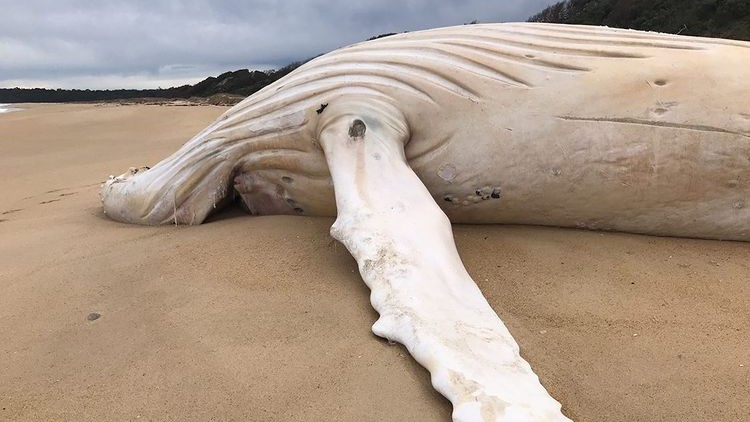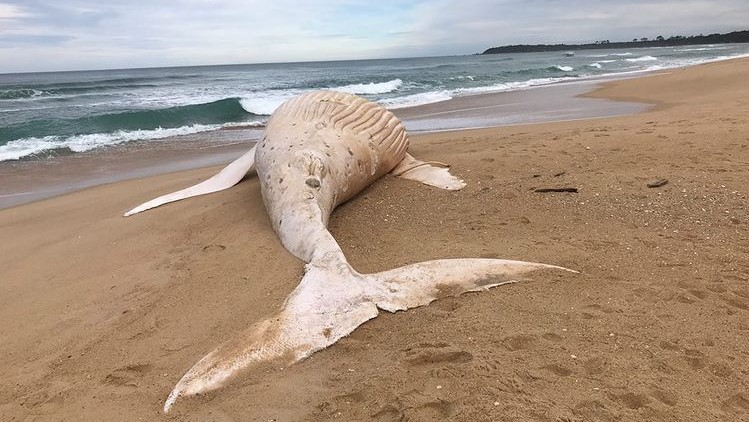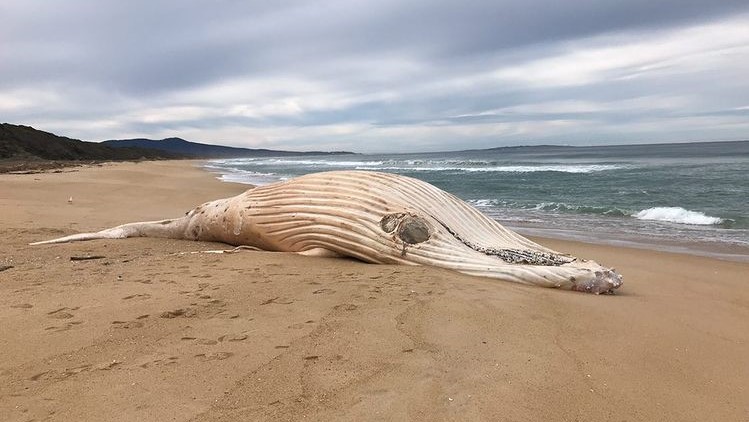Extremely rare white humpback whale washes up dead on Australian beach
But experts say it is not an albino.

An extremely rare white humpback whale recently washed up dead on a beach in Australia.
The unusually colored corpse was discovered July 16 by local resident Peter Coles as he was kayaking past a remote beach near Mallacoota, Victoria. The humpback was around 33 feet (10 meters) long and has been confirmed to be a juvenile female. "It was pure white" and had a marble-like appearance, Coles told Sky News. "I thought it looked like a sculpture; it almost didn't look real."
Despite the whale's white color, experts do not think the dead humpback is an albino. Officers from Victoria's Department of Environment, Land, Water and Planning (DELWP) traveled to the remote beach to assess the body and found that the whale was not completely white. "From what they've been able to see on the whale itself, there is evidence of patches of dark-colored skin on the whale," Peter Brick, regional agency commander for DELWP in the area, told ABC News. (Albinism is a genetic condition that prevents animals from producing any of the pigment melanin, which gives color to skin, feathers and eyes.)
Related: Real-life Moby Dick spotted off the coast of Jamaica
dInstead, the whale may have had leucism, a genetic condition similar to albinism that affects some individual cells' ability to produce melanin and can cause patchy discoloration. Wildlife officers have sent tissue samples from the whale to Museums Victoria for DNA analysis, which will help confirm the condition, according to ABC News.
Another possible explanation for the whale's ghostly hue is that some of the whale's skin had fallen off as the body decomposed. This can happen due to sun exposure and the lapping of the waves as dead whales float on the surface, which can expose lighter skin underneath, Vanessa Pirotta, a wildlife scientist at Macquarie University in Australia, told ABC News. However, "it seems to be most likely a white whale," she added.

When the dead whale was discovered, some feared the animal was Migaloo, an albino male humpback who became famous in Australia after being first sighted in Queensland in 1991. No one has seen Migaloo for around two years, which means he may have died. However, the whale's size, sex and lack of albinism have ruled out that it was Migaloo, providingsome hope that he may still be alive. (Migaloo means "white fella" in the language of the Aboriginal community that lives near where the albino whale was discovered.)
Sign up for the Live Science daily newsletter now
Get the world’s most fascinating discoveries delivered straight to your inbox.
In April, another juvenile white humpback was spotted swimming with dolphins in New South Wales, and images suggested that this individual was also leucistic and not albino. However, there is no evidence that this whale is the same as the dead whale on the beach.

It is still unclear exactly why the whale died, but it likely died several days before it washed ashore. The most likely cause of death was probably a vessel strike, Wally Franklin, a marine ecologist at Southern Cross University in Australia, told ABC News. "We were unable to see the upper side of the body, and if it has been hit by a ship, there'd probably be scarring and damage on the upper side of the body," Franklin said.
However, the whale could have been killed by disease or parasites, Franklin added.
The DELWP has chosen to leave the corpse on the beach to decompose naturally, because its remote location will prevent bad smells or the arrival of scavengers from bothering local people.
Originally published on Live Science.

Harry is a U.K.-based senior staff writer at Live Science. He studied marine biology at the University of Exeter before training to become a journalist. He covers a wide range of topics including space exploration, planetary science, space weather, climate change, animal behavior and paleontology. His recent work on the solar maximum won "best space submission" at the 2024 Aerospace Media Awards and was shortlisted in the "top scoop" category at the NCTJ Awards for Excellence in 2023. He also writes Live Science's weekly Earth from space series.









